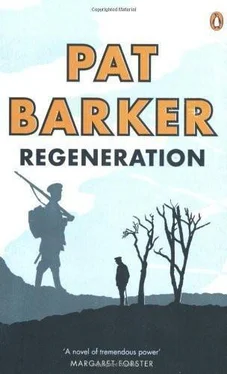‘So you were left feeling…?’
‘Like a precipice on a country road.’
‘Yes.’
Sassoon looked straight at Rivers. ‘Apparently he’s being — the boy — sent to some psychiatrist or other.’
‘Which school was this?’
‘Charterhouse.’
‘Ah.’ Rivers looked up and found Sassoon’s gaze on him.
‘To be cured.’ A slight pause. ‘I suppose cured is the right word?’
Rivers said cautiously, ‘Surely it’s better for him to be sent to this psychiatrist than to go to prison?’ In spite of himself he started to smile. ‘Though I can see you might not think so.’
‘He wouldn’t have got prison!’
‘Oh, I think he might. The number of custodial sentences is rising. I think any psychiatrist in London would tell you that.’
Sassoon looked downcast. ‘I thought things were getting better.’
‘I think they were. Before the war. Slightly. But it’s not very likely, is it, that any movement towards greater tolerance would persist in wartime? After all, in war, you’ve got this enormous emphasis on love between men — comradeship — and everybody approves. But at the same time there’s always this little niggle of anxiety. Is it the right kind of love? Well, one of the ways you make sure it’s the right kind is to make it crystal clear what the penalties for the other kind are.’ He looked at Sassoon. ‘One of the reasons I’m so glad you’ve decided to go back. It’s not just police activity. It’s the whole atmosphere at the moment. There’s an MP called Pemberton Billing. I don’t know whether you’ve heard of him?’
Sassoon shook his head. ‘I don’t think so.’
‘Well, he’s going around London claiming to know of the existence of a German Black Book containing the names of 47,000 eminent people whose private lives make their loyalty to their country suspect.’
‘Relax, Rivers. I’m not eminent.’
‘No, but you’re a friend of Robert Ross, and you’ve publicly advocated a negotiated peace. That’s enough! You’re vulnerable , Siegfried. There’s no point pretending you’re not.’
‘And what am I supposed to do about it? Toe the line, tailor my opinions —’
‘Not your opinions. I think you told me once that Robert Ross opposes the war? In private. ’
‘I wouldn’t want to criticize Ross. I think I know him well enough to understand the impact those trials had on him. But what you’re really saying is, if I ‘can’t conform in one area of life, then I have to conform in the others. Not just the surface things, everything. Even against my conscience. Well, I can’t live like that.’ He paused, then added, ‘ Nobody should live like that.’
‘You spend far too much time tilting at windmills, Siegfried. In ways which do you a great deal of damage — which I happen to care about — and don’t do anybody else any good at all.’ He hesitated, then said it anyway. ‘It’s time you grew up. Started living in the real world.’
Prior was not making a good impression. Getting a few simple facts out of him was like extracting wisdom teeth. At first Rivers thought Prior was simply being awkward — always a fairly safe assumption with Prior — but then he noted the tension in his jaw and realized the extent of the internal conflict that was going on. Prior had said he wanted nothing more than to get back to France as soon as possible, to get away from what he called ‘the shame’ of home service, and Rivers had no doubt that was true. But it was not the whole truth. He also wanted to save his life, and, in insisting on the importance of the asthmatic attacks, Rivers had, perhaps cruelly, held out the hope that he might be permitted to live. Small wonder, then, that Prior answered questions in monosyllables and finally, when asked whether he felt physically fit for service, said nothing at all, simply stared at Huntley, unable either to claim that he was ill or to deny it. Watching him, Rivers was filled with the most enormous compassion for his dilemma. Poor little blighter, he thought. Poor all of them.
Outside in the waiting room Sassoon looked at his watch. They were running almost an hour late and he wasn’t even next. Pugh was next. Pugh was a Welshman with prominent green eyes and the worst twitch Sassoon had ever seen, even in Craiglockhart, that living museum of tics and twitches. Pugh’s consisted of a violent sideways movement of the head, accompanied by a sound midway between a gasp and a scream. He did this approximately every thirty-five seconds. Like everybody else in the hospital, Sassoon’s reflexes were conditioned by the facts of trench warfare. It was almost impossible for him not to dodge whatever it was Pugh was dodging. Something Owen had told him about Pugh was hovering round the fringes of his mind. Yes, that was it. Some kind of freak accident, a hand grenade bouncing off the wire. Pugh had been picking bits of his platoon off his gas cape for an hour.
Sassoon looked at his watch again. Even allowing for the fact that nobody in their right mind could take long to decide whether Pugh was fit for duty, he couldn’t hope to be out of the place before six. He was supposed to have tea with the Sampsons at four thirty. Even if he left now and caught a tram immediately, he still wouldn’t be on time. It was too bad. People who were prepared to die had at least the right not to be kept waiting. He closed his eyes again. He was so tired he really thought if it wasn’t for Pugh and that dreadful jerking, he might have managed to nod off. He’d hardly slept at all last night.
In his breast pocket was a letter from Joe Cotterill, the Battalion Quartermaster. Sassoon knew it almost off by heart. Joe’s journey to Polygon Wood with the rations, the ground as full of holes as a pepperpot lid, nothing but mud and dead trees as far as the eye could see. They’d spent the night in a shell-hole, lost, under heavy fire. Several of the ration party had been killed. But, said Joe, the battalion got their rations. Reading that, Sassoon had wanted to rush back to France at once, but then, right at the end of the letter, Joe had said: Buck up and get out of there. Go to Parliament. Surely they can’t keep you there against your will? The trouble was, Sassoon thought, sighing and looking at his watch, that Joe’s anonymous ‘they’ was his Rivers.
Thorpe arrived. ‘D-d-d-do w-w-w-wwe kn-kn-know wwhwhat’s t-t-t-t-taking s-s-so l-l-long?’ he asked after a while.
Sassoon shook his head. Pugh shook his head too, though whether in answer to the question it was difficult to tell. And suddenly Sassoon had had enough. ‘And I for one don’t intend to stay and find out.’
He had a fleeting impression of Thorpe and Pugh with their mouths open, and then he was striding out of the room, down the corridor, through the swing doors and away.
‘Pugh next, I think?’ said Bryce.
‘Hang on, old chap,’ Huntley said. ‘Got to pump ship.’
The door closed behind him. Bryce said, ‘Where do you suppose he finds these nautical expressions?’ Receiving no reply, he turned to Rivers.
‘Why we had to take an hour over that I shall never know.’
‘Prior didn’t help himself much, did he?’
Rivers didn’t answer.
‘And at least you got what you wanted. In the end.’
The major came back, buttoning his breeches. ‘All right, all right,’ he said, as if he ’d been waiting for them. ‘Let’s get on.’
Pugh was quick and distressing. Since the orderly had gone off to have dinner, Rivers himself went into the waiting room to summon Sassoon. Thorpe was sitting there alone. ‘Have you seen Sassoon?’
Читать дальше












